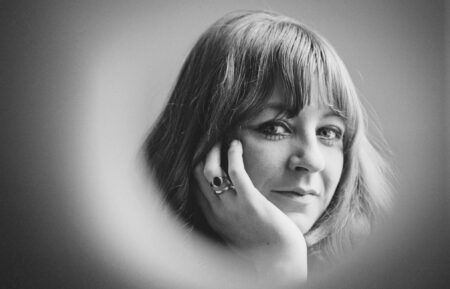Christine McVie

Musician • Singer
Birth Date: July 12, 1943
Death Date: November 30, 2022 — 79 years old — obituary
Birth Place: Bouth, England, UK
Spouses: John McVie
Partners: Dennis Wilson
Bands: Fleetwood Mac
A key figure in the British-American rock band Fleetwood Mac during its most successful period in the 1970s and '80s, Christine McVie sang, wrote and played keyboards on some of the band's biggest hits, including "Over My Head," "Say You Love Me," "Don't Stop" and "Little Lies." She emerged in the British blues scene of the late 1960s as a member of Chicken Shack, scoring a Top 20 hit with a cover of Etta James' "I'd Rather Go Blind" that established her as one of England's most soulful voices.
After marrying Fleetwood Mac bassist John McVie, she joined the group in 1970 and rose with it to global stardom on the strength of their 1975 album Fleetwood Mac and especially Rumours (1977), arguably the band's finest release. However, the Mac's ascent to stardom was not without its sacrifices, most notably the McVies' marriage, which dissolved in 1978 after years of turmoil.
Christine McVie emerged as a solo success with her eponymous 1984 solo album, but soon returned to the Fleetwood Mac ranks for a string of wildly popular records in the late 1980s and early 1990s. After their induction in the Rock and Roll Hall of Fame in 1998, McVie retired from Fleetwood Mac, but her contributions to its astounding popularity made her one of the more accomplished female singer-songwriters of the 20th century. Her 2014 reunion with Fleetwood Mac, cemented by a 2017 duet album with Lindsey Buckingham, served as a final victory lap in a compelling career.
Born Christine Anne Perfect in the village of Bouth in England's Lake District on July 12, 1943, she was the daughter of violinist Cyril Perfect and his wife Beatrice, a medium and faith healer. McVie began playing piano at the age of four, which evolved into classic training from early adolescence into her mid-teens. However, her focus soon shifted to rock 'n' roll after an older brother brought home a Fats Domino songbook.
Still, music remained only a hobby for McVie, who attended art school with the intention of becoming an educator like her father. Once again, rock music disrupted her plans when she became invested in the pop music scene in Birmingham. There, she began playing bass with a band, Sounds of Blue, and remained with them until her graduation from college, after which the band called it quits.
Armed with a degree, but lacking the funds to establish herself in the art world, McVie moved to London, where she worked as a window dresser at a department store. In 1967, she received word that Andy Silvester and Stan Webb, two of her former bandmates in Sounds of Blue, had launched a new R&B-flavored group called Chicken Shack. McVie became the band's keyboardist the following year, when she also penned one of her earliest songs, "When the Train Comes Back," for their debut album, 40 Blue Fingers, Freshly Packed and Ready to Serve, which grazed the Top 10 on the U.K. album charts in 1968.
McVie's sultry alto voice, which scored Chicken Shack a Top 20 single with a cover of Etta James' "I'd Rather Go Blind," helped to make the band a popular attraction on the English blues club scene, where they frequently shared bills with Fleetwood Mac, a blues-rock outfit featuring three former members of John Mayall's Bluesbreakers: guitarist Peter Green, drummer Mick Fleetwood and bassist John McVie. She soon began appearing on Fleetwood Mac's albums, beginning with 1968's Mr. Wonderful, while enjoying a whirlwind courtship with John McVie. The couple soon married, but found it difficult to enjoy domestic life due to their respective concert schedules. McVie decided to leave Chicken Shack in 1969, but not before releasing her first solo album, Christine Perfect, that same year.
Shortly thereafter, McVie announced her retirement from music, but her husband soon coaxed her back into the spotlight. Fleetwood Mac was in a state of flux after losing several of its key players, including Green, who had lapsed into drug addiction and mental illness. McVie soon took up residence as the Mac's keyboard player during one of the most difficult periods in the band's history. Their decision to shift their musical focus away from blues towards a more pop-oriented sound had gained them a larger audience, but the McVies and Fleetwood - the core of the group - found it difficult to keep players in their ranks in order to support their albums with live shows. The McVies themselves were undergoing considerable internal pressure due in part to John McVie's alcoholism, which would grow more untenable as time wore on.
In 1975, Fleetwood Mac brought American singer-songwriters Lindsey Buckingham and Stevie Nicks into the fold. Their addition formed the nucleus of the group's most successful incarnation, as well as its longest-running. The new Fleetwood Mac debuted in 1975 with an eponymous LP that set a music industry record by reaching the top of the Billboard albums chart a year after its release. The album also established McVie as a star in her own right thanks to her warm, wistful "Over My Head" and "Say You Love Me," a pair of pop songs that earned Top 20 status. Unfortunately, the album's success, as well as McVie's own personal triumph, was sorely tempered by the collapse of her marriage. John McVie's drinking and Christine McVie's affair with the band's lighting director directly contributed to their separation, which would end in divorce two years later.
Their personal turmoil was just part of a larger maelstrom that also swept up the other members of the band. The pressures of fame and touring wore down the group's resolve, and by 1977, Buckingham and Nicks had split, while Fleetwood was embroiled in a divorce. This intense emotional upheaval fueled the band's next album, 1977's Rumours. Songs like Buckingham's "Go Your Own Way" and Christine McVie's "Don't Stop" were the gorgeous, gilded end result of tumultuous recording sessions spurred into marathon psychodramas due to copious amounts of drugs. The McVies only spoke to each other in regard to music during this period, and the pain of hearing his ex-wife sing about putting their past behind her on "Don't Stop" nearly drove John McVie to suicide. Despite the unchecked turmoil of the recording sessions, Rumours went on to become Fleetwood Mac's signature album, netting not only the Grammy for Record of the Year but critical acclaim as one of the best albums of the 1970s.
After recording the double album Tusk (1979), the members of Fleetwood Mac decided to take a much-needed hiatus. McVie soon became involved with Dennis Wilson of the Beach Boys, another talented musician plagued by tremendous substance abuse issues. Their painful relationship generated a Top 5 hit with "Hold Me," from Fleetwood Mac's 1981 album, Mirage. By the time of its release, the band members were barely on speaking terms, and McVie poured her songwriting talents into an eponymous solo album, which saw release in 1984. The record, which featured such superstar guest talent as Eric Clapton, Steve Winwood and, to the surprise of many, Lindsey Buckingham, reached No. 26 on the U.S. album charts on the strength of the Top 10 single "Got a Hold on Me." Three years later, the Rumours-era Fleetwood Mac reconvened for Tango in the Night (1987), which became the second highest selling album in the band's history thanks to singles like McVie's "Little Lies" and "Everywhere." Internal stresses once again rang down the curtain on the band, with Buckingham quitting shortly before a world tour to support the record. McVie herself would stop touring with the group in 1990 following the release of 1990's Behind the Mask, though she joined Buckingham, Nicks, Fleetwood and John McVie for a special performance at President Bill Clinton's inaugural ball in 1992.
The appearance sparked new interest in Fleetwood Mac, spurring Fleetwood and John McVie to assemble a new line-up, which included Dave Mason of Traffic and Bekka Bramlett, daughter of famed '70s rock duo Delaney & Bonnie. McVie contributed five songs to Time, a 1995 album featuring this configuration, but did not accompany them on a global tour. However, the record was a dismal failure, which caused Fleetwood to disband the group after nearly four decades. But within a year, Fleetwood was working with Lindsey Buckingham on new music. Nicks and the McVies soon joined the project, which bloomed into a full-fledged reunion of the Rumours lineup in 1997. The revived Fleetwood Mac performed a concert at a Warner Bros. soundstage that was released as The Dance (1997). Its combination of classic songs and new material shot to No. 1 on the albums chart, the first Fleetwood Mac record to do so since Mirage in 1982. A massively successful world tour soon followed, as well as induction into the Rock and Roll Hall of Fame in 1998. Shortly thereafter, McVie announced her retirement from Fleetwood Mac, stating she wanted to return to her native England and work in her gardens.
In the years that followed her final separation from Fleetwood Mac, McVie kept an exceptionally low profile, emerging only sporadically to accept accolades like an Honorary Doctorate in Music from the University of Greenwich in England. In 2004, she released her third solo album, In the Meantime, which featured songs written by McVie and her nephew, Dan Perfect. Its lead single, "Friend," reached No. 26 on the Adult Contemporary charts. Two years later, she received the Gold Badge of Merit from the British Academy of Songwriters, Composers and Authors. In 2014, McVie rejoined a reformed Fleetwood Mac, but when tensions between Stevie Nicks' solo career and band priorities came to a head, McVie and Buckingham released the duet album Lindsey Buckingham and Christine McVie in 2017. With bass and drum work from John McVie and Mick Fleetwood, it was fundamentally a Fleetwood Mac album minus Nicks. Christine McVie died on November 30, 2022 at the age of 79.
Credits

Mick Fleetwood and Friends: Celebrating the Music of Peter Green

Fleetwood Mac's Songbird: Christine McVie

Fleetwood Mac: Their Own Way

The Late Late Show With James Corden

CBS This Morning: Saturday

The Talk

Fleetwood Mac: Don't Stop

Fleetwood Mac: Unbroken Chain

Fleetwood Mac: Unbroken Chain

Fleetwood Mac: The Dance

Classic AlbumsStream









